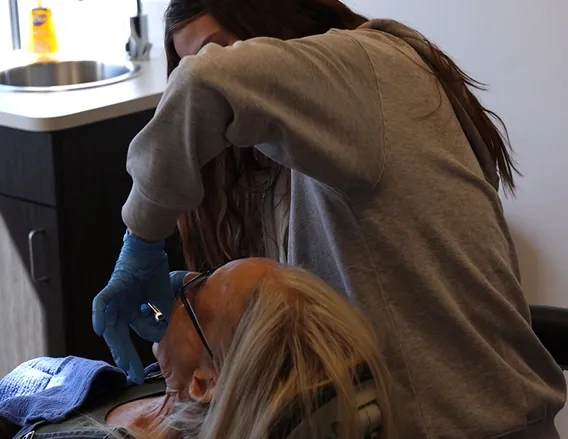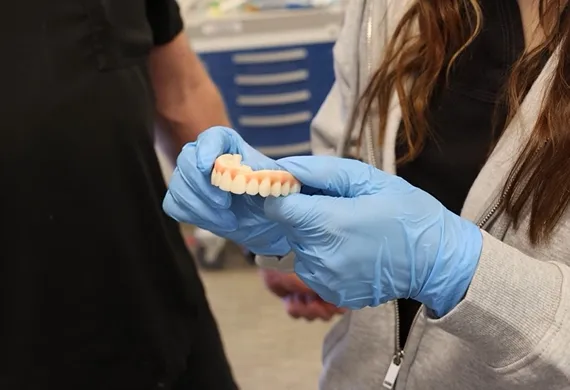Dental implants are a durable solution for replacing missing teeth and are the go-to dentist recommendation when a patient needs to replace one or more teeth. With leading technology, the process is designed to give you an immediate smile while still supporting your healing over several months.
To answer the question “Is dental implant safe?” – Yes, dental implants are safe. Implants are known for their longevity and safety for many individuals. Here’s a comprehensive look at their safety and what you should know if you’re considering them.
What Are Dental Implants?
Dental implants are new teeth designed to replace missing or damaged teeth. They consist of three main components: a titanium (or zirconium) post, an abutment, and a crown, or restoration. The post serves as the root of the new tooth and is surgically placed into the jawbone. The abutment connects the post to the crown, which is the visible part that looks like a natural tooth.
The most common material for dental implants is titanium. Titanium is strong, durable, and biocompatible, meaning it integrates well with the jawbone through a process called osseointegration. This integration provides a stable and secure foundation for the new tooth.
Alternatives to titanium include zirconia implants, which are ceramic and offer a metal-free option. Zirconia is also biocompatible and suitable for those with metal allergies.
The dental implant process at NuSet involves several steps:
- After consultation, our dentist evaluates your mouth, takes X-rays, and creates a personalized treatment plan.
- After this, the post is surgically inserted into the jawbone, followed by the abutment and temporary restoration.
- Healing time is necessary for the bone to grow around the implant, after which our oral specialist will fit your final, custom-design restoration. This completes the dental implant.
What we have outlined above is the “Teeth in a Day” option for patients who qualify. This procedure allows for the placement of a temporary crown on the same day as the implant surgery. It reduces the waiting time for the final crown and provides immediate function and appearance.
Dental implants are a reliable and effective solution for tooth replacement, offering durability and an immediate natural appearance. With options like “Teeth in a Day,” patients can enjoy the benefits of dental implants with reduced waiting times.
Are Dental Implants Safe?

Yes, dental implants are safe when performed by an experienced oral specialist. Dental implants have a success rate of 98%, making them one of the most successful dental procedures. This high success rate is due to the advancements in dental technology and the thorough planning and evaluation done before the procedure.
Although dental implants are generally safe, some risks and potential complications include:
Infection
Like any surgical procedure, there is a risk of infection at the implant site. Proper hygiene and follow-up care can minimize this risk. This is why our dentists and oral surgeons at NuSet Dental Implants and Oral Surgery provide patients with adequate aftercare instruction tailored to them after surgery. This helps to reduce the risk of infection and increases the longevity of the implants.
Nerve damage
In rare cases, the implant can cause nerve damage, leading to pain or numbness. This risk is minimized by precise planning and placement of the implant.
Sinus problems
Implants placed in the upper jaw can protrude into the sinus cavities, causing sinus issues. However, this can be managed with careful surgical planning.
How to Manage Pain and Discomfort After Dental Implants
Experiencing some pain and discomfort after dental implant surgery is normal. Here are some practical steps to help you manage these symptoms and ensure a smooth recovery:
- Apply a cold compress or ice pack to the affected area for 15-20 minutes at a time during the first 24-48 hours. This can help reduce swelling and numb the area, providing relief from discomfort.
- For the first few days after the procedure, stick to soft foods. Yogurt, mashed potatoes, applesauce, and smoothies are gentle on the surgical site.
- Drink plenty of water to stay hydrated. Avoid using straws, as the suction can interfere with healing.
- Rinse your mouth with warm salt water several times a day, especially after meals. This helps keep the area clean and reduces swelling.
- Rest and avoid strenuous activities for a few days after the surgery. Physical exertion can increase blood flow to the surgical site, leading to more swelling and discomfort.
- When lying down, keep your head elevated with pillows. This can help reduce swelling and promote healing.
- Be aware of signs of complications, such as excessive bleeding, severe pain, or signs of infection (redness, swelling, pus). Contact us immediately if you experience any of these symptoms.
- Take prescribed medications as directed.
- Attend all scheduled follow-up appointments. This will help us monitor your healing progress and address any issues that may arise.
Are You Ready for a Safe and Effective Tooth Replacement?
Dental implants offer a reliable and long-lasting solution for missing teeth. They are made from safe materials like titanium and zirconia, and the multi-step procedure ensures proper integration with your jawbone.
With a high success rate and the ability to function like natural teeth, dental implants can significantly improve your oral health and quality of life.
If you’re considering dental implants, consult with our experienced dental professionals at NuSet Dental Implants and Oral Surgery. We offer comprehensive evaluations and personalized treatment plans, including the convenient “Teeth in a Day” option. Contact us now to schedule a consultation and take the first step toward a healthier, more confident smile.
Frequently Asked Questions
What are the risks of dental implants?
Dental implants are generally safe, but they do come with some risks. One potential risk is infection at the implant site, which can occur without proper oral hygiene. Another risk is nerve damage, which can cause pain, numbness, or tingling in the surrounding areas. In the upper jaw, there is a risk that the implant could protrude into the sinus cavity, leading to sinus issues. Also, in some cases, the implant may fail to integrate with the jawbone properly, resulting in implant failure. Factors such as poor bone quality, smoking, and certain medical conditions can increase the likelihood of these risks, but our team at NuSet is here to help design the best possible implant treatment plan for your unique circumstances.
Are dental implants worth the risk?
Absolutely, dental implants are worth the risk for most people due to their high success rate and long-term benefits. They provide a permanent solution for missing teeth, improve oral health, and enhance the ability to eat, speak, and smile confidently. With proper care and regular dental visits, the risks associated with dental implants can be easily minimized.
Are dental implants safe long term?
Yes, dental implants are considered safe for long-term use- and may even be considered as the safest option. They are made from biocompatible materials like titanium, which integrate well with the jawbone. Studies show that with proper care, dental implants can last a lifetime, providing a durable and effective solution for tooth replacement.
Who should not get dental implants?
Some people may not be suitable candidates for dental implants. People with severe jaw bone loss may need bone grafting before implants can be placed. Those with uncontrolled diabetes have a higher risk of infection and slower healing, which can complicate the implant process. Smokers also face increased risks of implant failure and impaired healing. Also, children and adolescents whose jawbones are still growing are typically not suitable candidates for dental implants.





